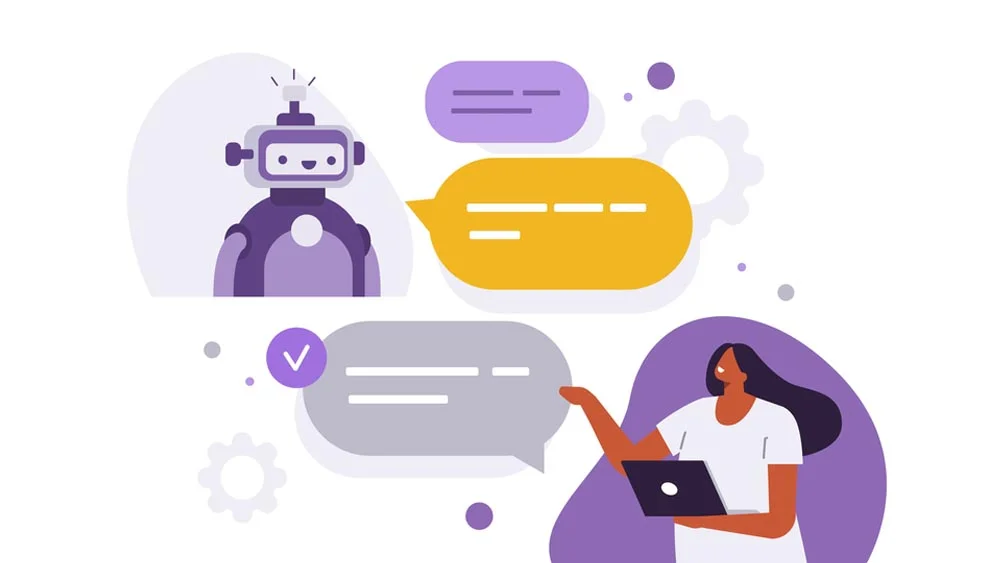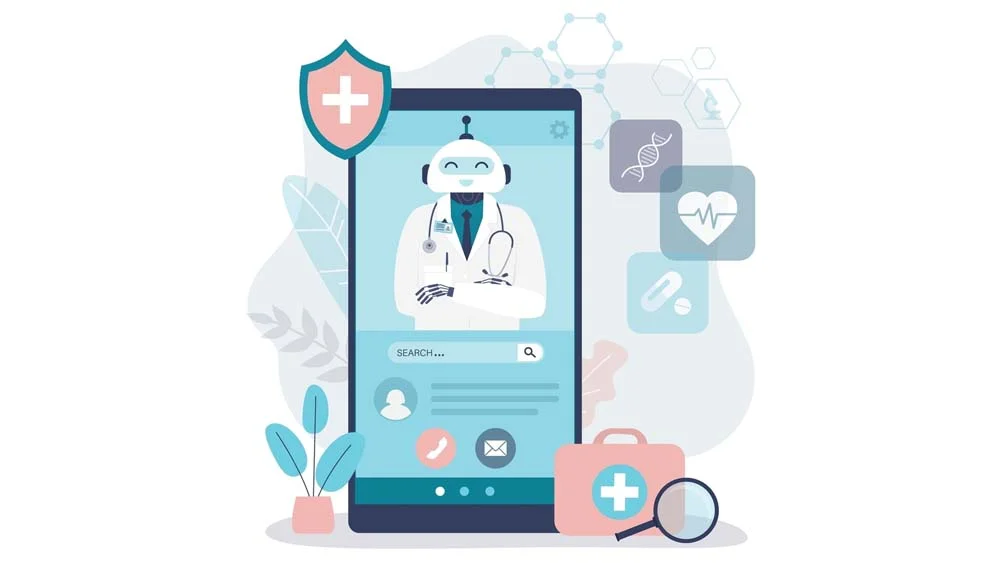How can businesses leverage the power of artificial intelligence (AI) to create more engaging, efficient, and profitable customer interactions? The answer lies in chatbots. These intelligent virtual assistants have rapidly evolved from simple FAQ bots to sophisticated conversational chatbots capable of handling complex customer inquiries, driving sales, and automating routine tasks.
That said, this guide will explore the essential components of chatbot technology and offer practical guidance on implementing them to achieve business objectives.
What Are Chatbots?
Chatbots are software applications designed to simulate human conversation and interaction through text or voice. They use AI and natural language processing to understand and respond to user inputs in a way that mimics human conversation. By leveraging chatbots for business, companies can integrate these digital assistants into websites, messaging apps, mobile apps, and other platforms to provide automated responses and services. For example, WhatsApp chatbot integration allows businesses to connect with customers on one of the world’s most widely used messaging platforms, providing instant and convenient support. This integration enhances customer service, streamlines operations, and offers personalized user experiences, making AI chatbots invaluable tools for modern businesses.
Key Features Of Chatbots
Understanding the key features of chatbots is crucial for businesses looking to implement these digital assistants effectively. Here are the essential features that define modern chatbots and their transformative potential for businesses:
- Natural Language Processing (NLP): This enables chatbots to understand and interpret human language, allowing them to process text or voice inputs accurately.
- Artificial Intelligence (AI): AI allows chatbots to learn from interactions, improving their responses over time and handling more complex queries.
- Pre-defined Scripts: Some chatbots operate on pre-set scripts to respond to specific queries, ensuring consistency and accuracy in their response time.
- Integration Capabilities: Chatbots can be integrated with various systems, databases, and APIs to fetch and provide real-time information.
By leveraging these key features, chatbots can significantly enhance customer service, streamline business operations, and provide personalized, efficient interactions across various industries.
Strategies For Implementing Chatbots In Business
By employing innovative strategies, businesses can harness the full potential of chatbots to streamline processes, engage customers, and improve overall user experience. Here are some effective strategies for implementing chatbots in various business contexts.
1. Customer Support and Service
Chatbots can revolutionize customer care support by providing 24/7 availability to users. Unlike human agents, top chatbots for small businesses can handle multiple queries simultaneously without downtime, ensuring that customers always receive prompt responses.
They can address common questions, guide users through troubleshooting processes, and even escalate complex issues to human agents when necessary. By integrating with ticketing systems, an AI Agent for Customer Service can automate the creation and tracking of support tickets, ensuring that no customer query is overlooked and that issues are resolved efficiently.
2. Sales and Lead Generation
In the field of sales, chatbots can serve as powerful tools for lead generation and nurturing. They can interact with potential customers visiting your website, asking qualifying questions to determine their needs and interests.
Based on the responses, a sales chatbot can provide personalized product or service recommendations, increasing the chances of conversion. Furthermore, chatbots can capture lead information and schedule follow-ups, ensuring that sales representatives engage with high-potential leads in a timely manner, especially when combined with Inbound AI SDR tools for smarter lead qualification and outreach.
3. E-commerce Assistance
E-commerce businesses can leverage chatbots to enhance the online shopping experience. Virtual shopping assistants can help customers navigate the website, find specific products, compare prices, and even suggest items based on their browsing history and preferences.
Chatbots can also streamline the checkout process by guiding users through each step and addressing any issues that arise. Additionally, chatbots can provide real-time updates on order status, shipping details, and delivery times, keeping customers informed and satisfied.
4. Marketing and Engagement
Chatbots can be instrumental in driving marketing and engagement efforts. They can create interactive marketing campaigns, such as quizzes, polls, or surveys, which not only engage users but also gather valuable data on customer preferences and behaviors.
This information can then be used to tailor future marketing strategies. For events, chatbots can handle promotions, send reminders, and manage registrations or RSVPs, ensuring that users are kept informed and engaged throughout the event lifecycle.
5. Human Resources
In the HR domain, chatbots can streamline various processes, enhancing efficiency and employee satisfaction. Chatbots can assist new hires with the onboarding process, providing information on company policies, benefits, and procedures.
Additionally, they can also answer common HR-related queries, reducing the workload for HR staff. Internally, chatbots can function as an IT helpdesk, addressing technical issues or guiding employees through troubleshooting steps, ensuring that employees remain productive.
6. Finance and Banking
In finance and banking, chatbots can significantly enhance customer service and security. They can assist users in managing their accounts, checking balances, transferring funds, and accessing financial advice.
Chatbots can also provide personalized financial recommendations based on user data. In terms of security, chatbots can monitor transactions for suspicious activity, alerting users to potential fraud and guiding them through the necessary steps to secure their accounts.
7. Healthcare
Healthcare providers can utilize chatbots to improve patient care and operational efficiency. Chatbots can assist patients in scheduling, rescheduling, or cancelling appointments, making the process more convenient.
Furthermore, they can also provide preliminary symptom assessments based on user input and direct patients to the appropriate medical resources or professionals. By automating these tasks, chatbots can free up healthcare staff to focus on more critical responsibilities, ultimately enhancing patient care.
8. Education
In the education sector, chatbots can support students and faculty by automating administrative and academic processes. Chatbots can help students with enrollment, course selection, and access to academic resources, ensuring that they have all the information they need to succeed. Additionally, chatbots can offer tutoring services, answer academic questions, and provide study materials, making learning more accessible and personalized.
9. Travel and Hospitality
Travel and hospitality businesses can significantly benefit from chatbots by enhancing customer service and operational efficiency. Chatbots can assist users in planning trips, booking flights and hotels, and providing itinerary suggestions based on their preferences.
Moreover, they can also address common travel-related queries, such as baggage policies, check-in procedures, and information on local attractions. By providing timely and accurate information, chatbots can enhance customers’ overall travel experience.
10. Real Estate
Real estate business owners can use chatbots to streamline property management and customer engagement. Chatbots can provide detailed information about available properties, schedule viewings, and answer questions from prospective buyers or tenants.
In addition, they can also offer virtual property tours, allowing users to explore properties remotely. By automating these tasks, chatbots can enhance the efficiency of real estate operations and improve the customer experience.
11. Entertainment
In the entertainment industry, chatbots can enhance user engagement and satisfaction. Chatbots can provide personalized content recommendations based on user preferences, helping users discover new movies, shows, music, or games. They can also facilitate ticket bookings for events, such as concerts and theaters, and provide information about event details. By offering a personalized and convenient experience, chatbots can drive user engagement and loyalty.
12. Retail
Retail businesses can leverage chatbots to improve inventory management and customer feedback processes. Chatbots can help store managers track inventory levels, reorder stock, and manage supplies, ensuring that shelves are always stocked with popular items.
Additionally, chatbots can collect and analyze customer feedback, providing valuable insights that can be used to improve products and services. By automating these tasks, chatbots can enhance the efficiency of retail operations and improve the overall customer experience.
Conclusion
The potential of chatbots to revolutionize business operations and customer experiences is undeniable. By effectively implementing the innovative strategies outlined in this article, organizations can unlock new opportunities for growth, efficiency, and customer satisfaction. Remember that businesses that embrace this transformative technology and adapt to evolving customer expectations will be well-positioned to thrive in the digital age.





